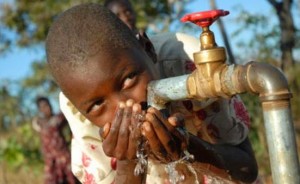About 10 million Ghanaians have no access to potable water
 Ghana has a water crisis, that needs urgent attention. Not only are the countries important rivers, streams and other water sources drying up, they are also being polluted by illegal miners.
Ghana has a water crisis, that needs urgent attention. Not only are the countries important rivers, streams and other water sources drying up, they are also being polluted by illegal miners.
Currently, an estimated 10 million Ghanaians of the total 25 million population, do not have access to potable water, according to Rev. Chris J. E. Y. Gawugbe, who is the District Environmental Health Officer of the Ashiedu Keteke sub-Metro in Accra.
He made the remarks at the commemoration of 2016 World Water Day in Accra Tuesday March 22, 2016. He also noted that globally, about one billion people do not have access to safe water, adding that many urban communities, including the Ashiedu Keteke sub-metro are among the most deprived communities in respect of water.
Rev. Gawugbe pointed out that the relationship between the lack of access to water and the health situation in the communities is evidenced by the number of water-related diseases that are recorded within the communities.
The Director of Communications at the Ghana Water Company Ltd (GWCL) Mr Stanley Martey pointed out that the security and sustainability of water resources and supply in the country are the responsibility of all, and not solely the GWCL.
He said while the GWCL would continue to do its best, the security agencies and other facets of society would also need to do their part.
Demonstrating the company’s dependence on external actors, Mr Martey said arresting of illegal miners who pollute water bodies, is not within the mandate of the company but rather lies with the security authorities.
The reporting of illegal connections by the public, he said, is also very important to the company’s operations, and GWCL could better address problems in the sector if more issues are brought to its attention by the public.
According to the Managing Director of GWCL, whistleblowers who report illegal connections to the security agencies or the GWCL are accorded 10 per cent of the cost of the water consumed illegally, as an incentive.
About 42 per cent of the water produced by the company is lost to illegal connections, depriving the company of needed resources to cover costs and improve its services.
The Director of Communications added that while the GWCL also uses four to five times more chemicals for treatment than it should be using, owing to pollution from illegal mining and other sources, there is a shortfall in its operating costs and the approved water tariff, making the company unable to meet costs.
“The government shouldn’t be supporting us after 50 years in operation. After 50 years of operations we should be exporting our expertise to other jurisdictions to earn more money for our country but we still depend on government,” he said.
“Is there anybody after 50 years still relying on his or her parents for ordinary food? No,” he quipped.
“We think it’s high time this is stopped; and it can be stopped when we all put our heads together and we manage our water bodies and other aspects of our economy effectively,” Mr Martey said.
The theme for World Water Day 2016 was “Better water, better jobs”.
The Minister for Water Resources, Works and Housing, Dr Kwaku Agemang-Mensah highlighted the essence of water resources saying that an estimated 95 per cent of jobs in agriculture, 30 per cent in industry and 10 per cent in the services sector, are all dependent on water.
In view of this, the minister said the recent water shortages that hit parts of the country due to a prolonged dry spell, “should be a wake up call to us and also remind us of the need to pay attention to issues that can cause such conditions in the future.”
By Emmanuel Odonkor
